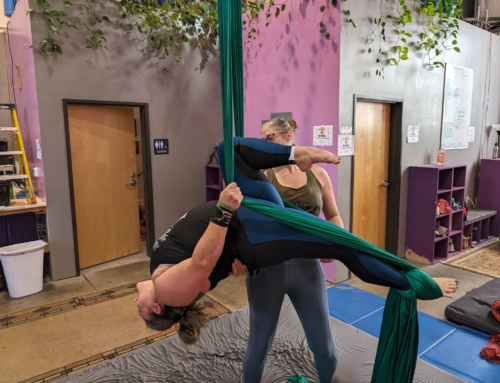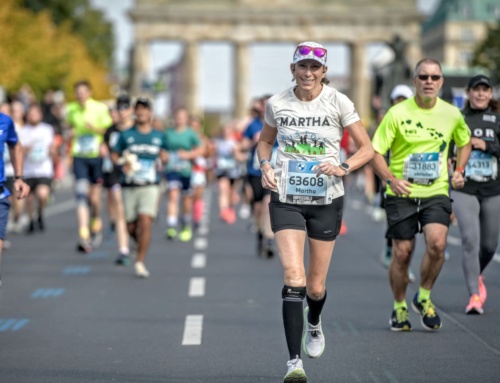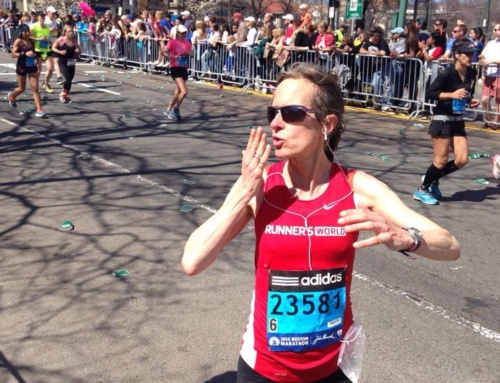[[A brief interruption to Deena Kastor week, but the message that #motherrunner Amanda shares today on the Running Through It Series is right up there with the positivity that Deena so epitomizes. Amanda writes about the effect the early death of her father had on her perspective on her own health—and the perspective she wants to give her two kids.]]
“This is the hardest thing I’ve ever had to say,” my stepmom started to tell me, “Your dad was playing volleyball, he had a heart attack, and he died.” I was a sophomore in high school and it was 20 years ago, but I’ll always remember those words.
My dad had some sort of electrical heart failure. We never found out what disease or syndrome caused his untimely death, but it was certainly a surprise. He was an active person, full of adventure, enthusiasm, and positivity. The last person you’d expect to die young.
At the time, I experienced some health symptoms, such as dizziness and fainting, that were similar to his so I went through a battery of examinations to rule out any genetically passed heart conditions. Thankfully, my cardiologists gave me the “all clear,” and I could rest my fears.
For a time.
Fast forward to spring 2015. I registered for my very first half-marathon. I discovered a passion for running after meeting my husband in 2010 and had run regularly, but this race would be my longest distance yet. I had given birth to my first child four months before and was breastfeeding, but I had returned to regular exercise and had devoted some time to training, so I felt prepared for the race.
On race day, I made it just over 10 miles and felt strong for most of it. I was proud of myself for getting my health back after the pregnancy and accomplishing my longest distance to date. However, I suddenly became very light-headed and ended up fainting and having a seizure. I spent three days in the hospital, during which I heard I might have a heart condition called Brugada Syndrome. Treatment would mean the implantation of a defibrillator to jump start my heart in case it stopped, but the procedure to implant it was invasive.

Amanda and her hubby on top of the world.
Thankfully, after more consideration, my cardiologists determined I didn’t have the syndrome and instead recommended that I have a loop recorder implanted, which was set to activate if I ever experienced an episode (medical term for fainting.) The activity of my heart prior to the episode would be retroactively recorded, so that my doctor could see what my heart was doing during that time.
When I was a sixteen-year-old and was having all of these cardiology tests done, I felt fear. I was afraid of my own mortality. Losing my dad—the thing I thought could never happen—revealed to me how precious and fragile life was. But then, I was afraid only for myself.
This time, at age 34 and with a brand new baby, I was terrified at the thought of losing time with my child. I thought about everything there was to lose. Watching him grow, letting him get to know his mommy, raising a family with my wonderful husband. It wasn’t only about me anymore—I needed to stick around for my family as well.
I took it easy on exercise for a while, which led to a lot of stress. I’m not sure how much was due to early-stage parenting (probably a lot) but I do know that I would have managed the stress better if I had the chance to run regularly. Other forms of exercise didn’t provide the same results as running for me. I craved the fresh air, the endorphins. But I was afraid. What if there was something wrong with my body? I never knew what killed my dad. What if I had the same thing?
In the beginning of 2016, I began to feel an internal impulse to run. My job as a middle school teacher is naturally quite stressful, but this school year was exceptionally rough, and it was only halfway done. I knew that my family deserved to have me at my best, and I knew that exercise was a key component of my mental well-being.
I hadn’t had any fainting episodes since my hospital stint, and I thought that if I could ease back into it—and this time listen, really listen, to my body—I might be able to reach a balance. I took my first couple of jogs and felt hooked. It was like rediscovering an old friend who has nothing but a positive impact on you. I took a leap of faith and registered for the same half-marathon I had tried and failed to complete.

Right: Amanda’s daughter, with curls a plenty.
One week before race day, I discovered that I was pregnant with my daughter. I briefly thought of pulling out of the race, thinking it was too risky.
Then I had another thought: How I want to model living for my children. How I want them to live responsibly, thoughtfully, but also without fear. I promised myself I would properly hydrate and not push too hard during the race. If I needed to walk it, I would walk it. But I needed to finish this race. It was a final step in ridding myself of fear. On the day of the race, I ran it and felt amazing. The miles passed by quickly, and I enjoyed every moment.
With each step, I felt myself moving towards an inexplicable threshold. This wasn’t just a finish line, this was symbolic of a new mindset. From now on, I wasn’t going to be flippant or careless about my health, but I also wasn’t going to let my fear of the unknown hold my mind or body hostage.
The following year’s race was just four months after my daughter’s birth. I decided not register and to push my body in a postpartum state, as my doctors hypothesized that may have been the cause for my accident. Instead, I cheered on my friends and loved ones who ran and completed the early bird registration for the following year.
Months later, I entered my cardiologist’s office and heard the best news I could hope to hear. My doctor was very confident that there was nothing wrong with my heart; that I’d had a freak accident but didn’t have any genetic abnormalities or arrhythmias to cause concern. I walked out of the office feeling light. I wanted to go running immediately. It seemed to be an appropriate way to celebrate.
I don’t believe I will ever complete an ultra-marathon, or maybe even a marathon. It isn’t an aspiration for me to do anything above a half. By I do know that running regularly keeps me grounded and happy and brings out my best self. Now that I am unencumbered by fear, I feel liberated to run for the rest of my life, which gives me profound gratitude.
Yesterday, I completed my second half-marathon. I was 15 minutes faster than my last time, despite being two years older. Today, I’m signing up for my third.
From my dad’s death, I’ve learned that life is precious and you should never take unnecessary risks with your health. Always get a third opinion. Prepare for the worst and hope for the best.
From my life’s experience, I’ve learned that quality trumps quantity, and if running enables you to be your best self, it’s worth it to find a way to make it work. You owe it to yourself and those you love most.







This could easily be my story, except I lost my mother. I had all of these same emotions and worried terribly about my mortality and my 2 young children. Thanks so much for sharing this. I just signed up for my 3rd half marathon last week!
I have a similar experience. At age 32 I started having light headedness and fainted after running a couple of times, and it was fluffed off by physicians as anxiety attacks. I knew it was more and pushed for testing. I was diagnosed with long qt syndrome, an often fatal arrhythmia. I have a pacemaker and ICD (implanted cardiac defibrillator) now. It shook my confidence to the core, but I pushed through the fear and now at 46 I’ll run my first marathon with my cardiologists blessing.
Moral of the story: Know your body and don’t be afraid to push for an answer when you know something is wrong.
All i can say is, good for you, Mother Runner! Thanks for sharing your story.